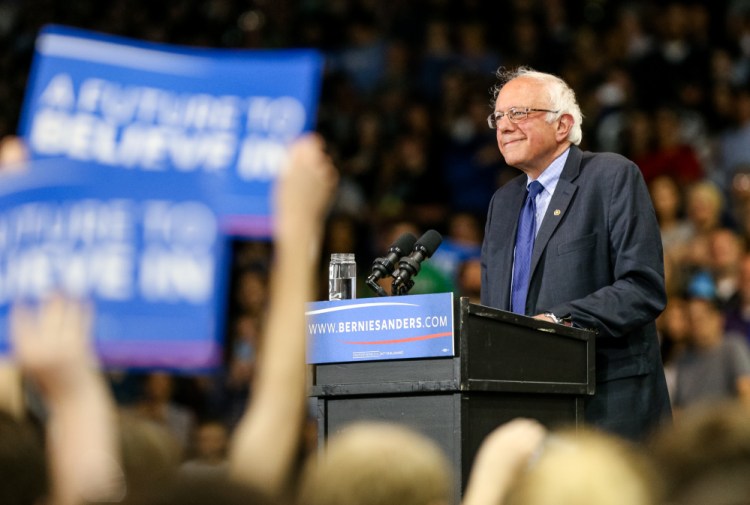WASHINGTON – Defeated in the Northeast, Bernie Sanders’ movement for a political revolution is reaching a crossroads even as he vows to campaign against Hillary Clinton through the June primaries and into the Philadelphia convention.
The Vermont senator said after losses to Clinton in Tuesday’s primaries in Pennsylvania, Maryland, Delaware and Connecticut that he would now seek as many delegates as possible to “fight for a progressive party platform,” acknowledging that he had only a “very narrow path” to the nomination.
“Every person in this country should have the right to vote for whom they want to see as president of the United States and what they want to see the agenda, Democratic agenda, look like,” Sanders said in a phone interview with The Associated Press late Tuesday.
“We are going to fight for every delegate and if I do not win, we are going to bring in a whole lot of delegates who are going to be prepared to fight for a $15 an hour minimum wage, for a Medicare for all single-payer program, guaranteed paid family medical leave … almost every delegate that we get gives us more strength in the fight for a progressive agenda.”
Sanders won the Rhode Island primary, adding to his trove of more than 1,300 delegates, but his loss in New York and Tuesday’s defeats in the delegate-rich states of Pennsylvania and Maryland is likely to change the focus of his campaign from winning the nomination to one devoted to shaping the Democratic platform, Clinton’s policy agenda and his movement to address income inequality and the campaign finance system.
Sanders was campaigning Wednesday in Indiana, which holds its primary next week, and looking ahead to upcoming contests in Oregon and California. He vowed to compete until the final District of Columbia primary in June.
Clinton’s campaign and Democratic leaders are watching closely to see if Sanders will continue to raise issues that could damage Clinton’s chances in November or whether he will encourage his youthful following to support Clinton.
“I would hope that there is a beginning of a pivot for him to make it really clear to his supporters what’s at stake against the Republicans,” said former Michigan Gov. Jennifer Granholm, who supports Clinton.
Clinton’s allies note that Republican Donald Trump has been co-opting Sanders’ pitch against Clinton, which the businessman acknowledged on Wednesday.
“Bernie Sanders has a message that’s interesting. I’m going to be taking a lot of things Bernie said and using it,” Trump said Wednesday on MSNBC’s “Morning Joe.” “When he said ‘Bad judgment’ I said, ‘Soundbyte!”‘
Former Pennsylvania Gov. Ed Rendell said Sanders had every right to compete until the end of the primaries as Clinton did in 2008. But he expressed hope Sanders would point out their differences but “not assail her judgment or character anymore.”
Rendell, a Clinton supporter, said that could undermine Sanders’ effort to address wealth inequality and campaign finance reform. “If he believes what he’s talking about, he’s got to understand that he’s got to help her by toning it down,” Rendell said.
At rallies, Sanders has sent mixed signals during the past week over whether he will ease up on Clinton. He has demanded that Clinton release the transcripts of her lucrative private speeches to Wall Street and critiqued Clinton on issues like trade, the minimum wage and the war in Iraq. But in other events Sanders has largely steered clear of Clinton, focusing instead on Trump.
In the AP interview, Sanders bristled when asked if he would continue to contrast his record with Clinton’s. “Of course. I’m getting attacked by Hillary Clinton and her surrogates every damn day. Every day we’re getting attacked and our record is being distorted,” he said.
“We are trying to run an issue-oriented campaign and a campaign means that you talk about your record, what you believe in, as opposed to your opponent’s. That’s what Clinton does. Of course we’re going to do that,” he said.
There’s also the issue of whether Sanders will urge his supporters to back Clinton.
In a town hall on MSNBC on Monday night, Clinton questioned the idea that she needs to adopt parts of Sanders’ platform to win over his supporters, saying that she did not make demands when she lost the primary to President Barack Obama eight years ago.
Progressive groups are pressuring Clinton and her Democratic allies to come to their side. Charles Chamberlain, executive director of Democracy for America, a liberal group backing Sanders, said Tuesday night the question isn’t whether the senator would win delegates.
“It’s whether the Democratic establishment is going to bring our party together by embracing our fight,” he said.
Sanders’ supporters want him to fight on. “There’s no reason he should drop out, or anyone should drop how they feel about him right now. If anything, the fact that he’s persevering at this point is inspiring,” said Maddie Harris, 17, of Parkersburg, W.Va., who attended Sanders’ West Virginia rally on Tuesday.
Associated Press writer Jonathan Mattise in Huntington, W.Va., contributed to this report.
Send questions/comments to the editors.


